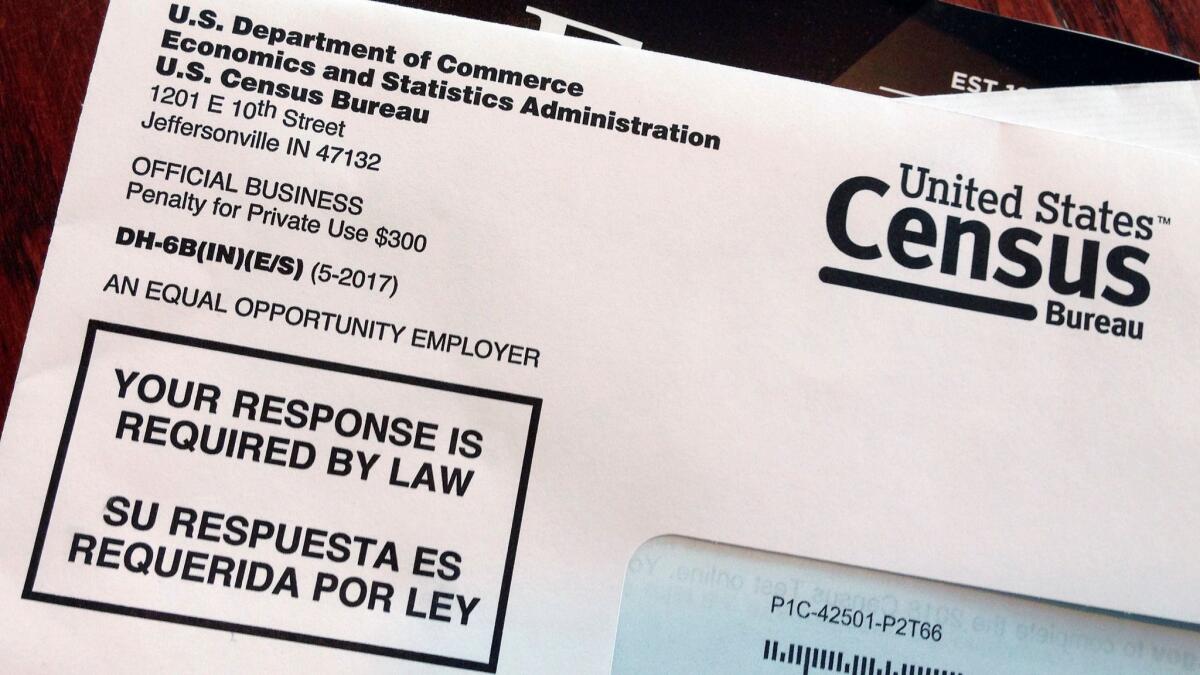Column: California has one year before a crucial census count. Money and clout are at stake

- Share via
One statistic explains why so many California civic and nonprofit advocacy groups are worried about next year’s U.S. census: 72% of the state’s population belongs to one of the groups historically undercounted during the once-a-decade process.
Researchers believe as many as 1.3 million residents could be missed — a mistake with profound political and policy implications for the next decade.
“There’s really a lot riding on census data,” Secretary of State Alex Padilla said at an event last week in Sacramento.
Monday is the one-year mark until Census Day, the official date for measuring the nation’s population, though final numbers won’t be available until the end of 2020. California’s demographers believe the state has grown by at least 2.5 million people since the last census in 2010.
Federal government dollars are often divvied up per capita, which means the census determines how much is spent on a variety of programs. The census is also the key building block to drawing political maps — from deciding how many seats each state gets in the 435-member U.S. House of Representatives to providing the raw data that California’s citizens redistricting commission uses to map out districts for the House, the state Legislature and the Board of Equalization.
But how will census officials find all those Californians? State government leaders may spend upwards of $150 million through next year to help verify addresses and expand outreach efforts.
Even then, there will be major hurdles. Those without reliable internet connections may be missed in a census where more than half the tally will happen through online surveys. Renters are notoriously hard to count, especially in dwellings with non-family members who don’t know whether they should mention everyone who lives there. If the apartment has more people than a landlord allows, they may refuse to answer any questions.
“The challenge is that there isn’t a lot of trust in government,” said Assemblyman Marc Berman (D-San Jose), who leads a special legislative committee tasked with finding ways to help get an accurate census count.
Big business’ political muscle in Sacramento is tested by new Democratic mega-majority »
Immigrants are especially leery, with a widespread (and false) assumption that census information will be shared with other government officials. Citizenship is perhaps the most hot-button issue this time around, as the administration of President Trump is now locked in a legal battle at the U.S. Supreme Court over whether immigration status can be asked — opposed by California officials and other states.
The citizenship question could significantly lower California’s official population count. Panelists at a Sacramento policy briefing on the census last week said some Bay Area communities could be undercounted by as much as 20% if immigrants — even those who are here legally and the U.S.-born children of others — were forced to disclose their legal status.
Some of the impacts of an inaccurate census are likely to be seen as partisan. A major undercount, for example, could cost California one of its 53 seats in the House and likely force a Democrat out of office. Others, though, could exacerbate the divide between rich and poor. The Children’s Health Insurance Program, which provides healthcare for kids whose families earn too much for Medi-Cal but too little to pay for coverage on their own, depends on census data. In all, California received some $115 billion in federal dollars linked to the process.
The task over the next several months, say state leaders, is to raise awareness in hard-to-reach communities that the census is coming and that being counted is vitally important. California’s diversity, it’s often said, is a strength. The census will put that premise to the test.
Follow @johnmyers on Twitter and sign up for our daily Essential Politics newsletter
More to Read
Get the L.A. Times Politics newsletter
Deeply reported insights into legislation, politics and policy from Sacramento, Washington and beyond. In your inbox three times per week.
You may occasionally receive promotional content from the Los Angeles Times.











